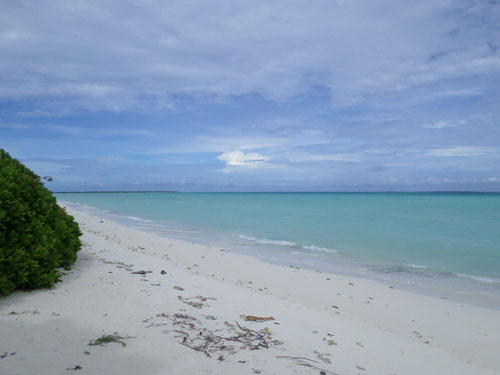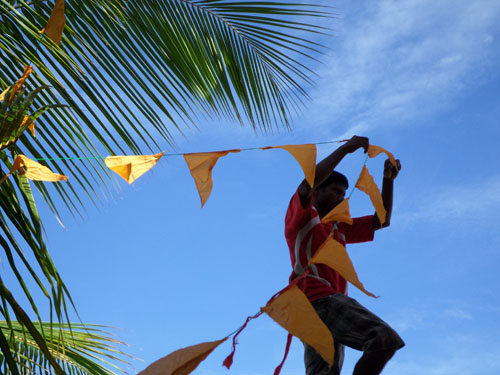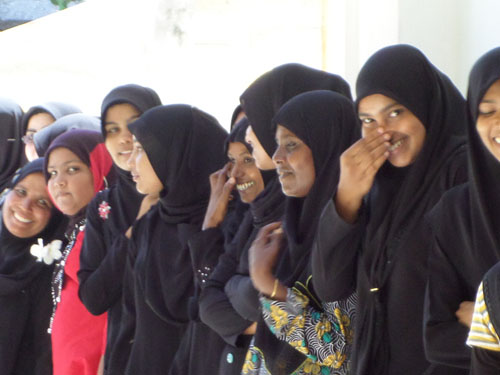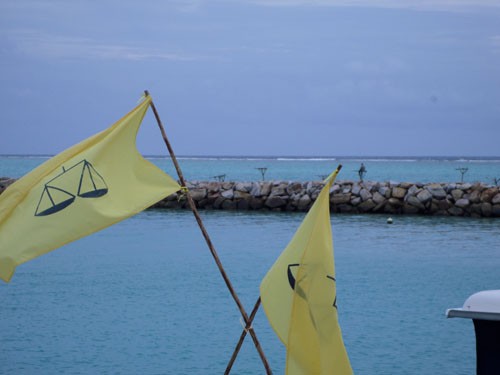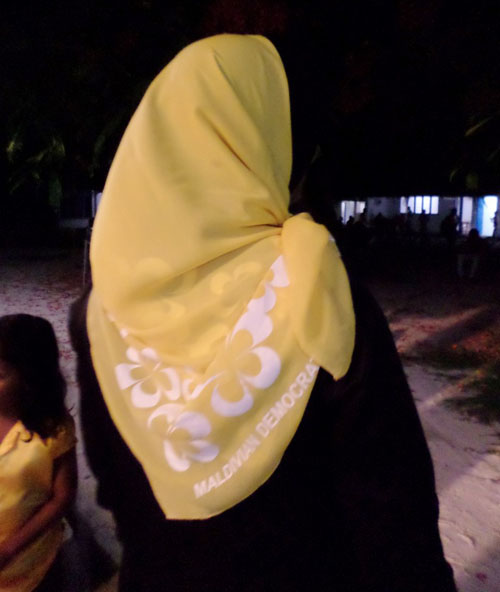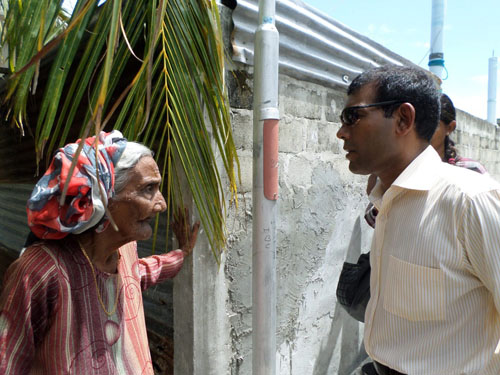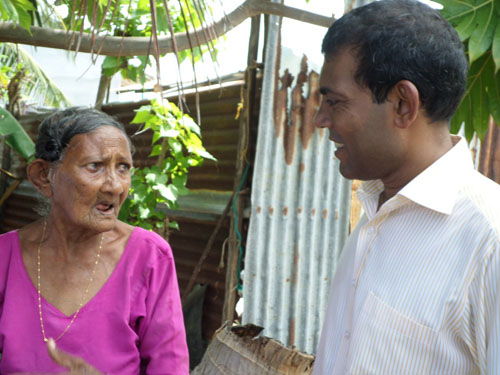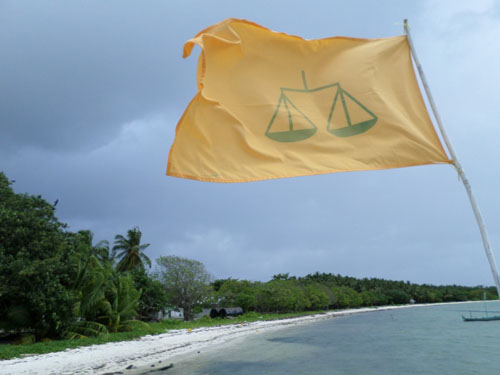The following speech was given by former President Mohamed Nasheed at the launch of the Maldivian Democratic Party (MDP)’s foreign policy. President Mohamed Waheed’s Independence Day address is available here.
Your Excellencies, distinguished guests, ladies and gentlemen,
We live in turbulent times. Times have always been turbulent.
We sit in the Indian Ocean, across a 1000km from North to South, where the bulk of the international trade passes. We are so strategically located that when the big boys fight, we are hemmed and wedged in-between.
The basis of our foreign policy is what my grandmother used to say, find a friend and stick with them, be good and be honest to them.
Our relationships do not depend on our fortunes, but on our ideals.
We are saddened that a number of countries with whom we shared our sentiments didn’t live up to our expectations.
But still our relationships do not depend on our political fortunes.
Down and under or up and above we still stick to our principles and beliefs.
A tolerant Islamic society, friends with everyone, enemies of no one.
The Maldives recently embarked on a remarkable journey towards democracy that sought to allow our people to live free, prosperous and dignified lives.
The adoption of a new constitution that guaranteed fundamental rights and allowed for separation of powers and term limits for the president was a key achievement.
So were the presidential, parliamentary and local government elections that took place in quick succession from late 2008 onwards.
Our party, the Maldivian Democratic Party, had the good fortune to become the first democratically elected government in our country’s history.
It is remarkable that after 30 years of one-man rule, the change took place through the ballot box, and that the transfer of power was peaceful and recognised as legitimate by both Maldivians and the international community.
We were also particularly proud and hopeful to be the first Muslim country in South Asia to have achieved a peaceful transition to democracy.
The people of Maldives placed a great deal of trust in us, and had high expectations that we would be able to deliver on our pledges so that the quality of their lives would be better.
In order to build the kind of society we want, we felt that it was imperative that we engage with the wider world and become responsible global citizens.
The Maldives has always maintained contact with the outside world. Historically we have been seafarers, traders, and explorers. We have never lived in isolation and we must not live in isolation in an interdependent world.
The mainstay of our economy is our hospitality industry. Close to a million tourists visit our shores every year to enjoy our country’s natural beauty and our people’s hospitality. Visitors to the Maldives has always been the norm.
Thus we feel that Maldives cannot afford to be an inward looking, and xenophobic country.
We need to be outward looking and cosmopolitan.
This is the foreign policy that the first MDP government pursued.
Human rights were an important part of our domestic policy platform. It was only natural that we took the promotion of these values to the wider world.
Our membership of the Human Rights Council was an important achievement. Indeed, we secured the highest number of votes in that election, and we used our platform to press for stronger global human rights protection mechanisms.
We aimed to increase foreign investment in the Maldives, through our pivot towards commercial diplomacy.
As we graduated from a Least Developed Country to a middle-income country, we knew that economic opportunities had to be expanded.
Trade not aid, became our new mantra. And the results were remarkable.
Statistics maintained by our Ministry of Economic Development show that out of the 1.5 billion dollars that flowed in through non-tourism foreign direct investment since 1980, over 50 percent was secured during our three years in government.
At US$500 million, the contract with GMR–Malaysia Airports consortium to develop the international airport in Male’ was the single largest investment in the country’s history.
A loan from the Export-Import Bank of China facilitated the development of 1,500 housing units in Hulhumale’ through a Chinese contractor.
By selling shares in Dhiraagu to the British company Cable and Wireless, we were able to begin work on a submarine cable project in partnership with the Japanese Hitachi Corporation that will provide high-speed internet connectivity throughout the length and breadth of the Maldives.
Climate change is a real existential threat to our country. Under the MDP government, Maldives moved away from being a victim of climate change to a leading voice in the debate. The role we played at the COP 15 Summit in Copenhagen attempted to bridge countries on different sides of the argument. We were pleased that the Copenhagen Accord pledged much needed funding for climate change adaptation for us and other countries vulnerable to the effects of climate change. We spoke on behalf of the Small Island States on the same platform as the world’s largest economies.
Maldives’ took a ‘can-do’ approach on climate change. We made a bold decision to become a carbon neutral country by 2020 and we were in the process of submitting our renewable energy investment plan to the World Bank in February 2012.
There were many other instances where our relationships with the outside world have proved fruitful to our people.
We have had important cultural exchanges, for instance through the Hay literary festival.
We set up an International Volunteer Corp, so that volunteers could travel to our beautiful country and help us with important social services.
We increased scholarships for our youth to study abroad.
These are just some examples of our interactions with our international partners and the benefits that our citizens gained through our foreign policy.
But of course, as you know, this story did not have a happy ending.
Fledgling democracies are fragile.
The success of a democracy does not rest upon the ability to give people a vote and to hold an election every few years. It requires a massive shift in power from a stronghold “deep state” to the masses.
On the 7th of February last year, I was forced out of the office that I was elected to just three years before. I set out the details of the coup in great detail in my testimony to the Commission of National Inquiry (CoNI). So I will not belabour the point here.
Some chose not to recognise the events that forced the country’s first democratically elected government out of office as a coup.
But what was clear to all even then, was that this was not how a democratically elected government in any country should be changed.
And what has become increasingly clear over time, is that the coup has reversed many political and developmental gains that the country had made during our three years of democracy.
We had taken one step forward, but were quickly forced to move two steps back.
The security forces continue to act with impunity and use excessive force against peaceful protesters.
Politically motivated prosecutions have become the norm. There are currently cases pending against all levels of the opposition, from the MDP’s presidential candidate to several hundred grassroots party activists.
Mismanagement of the economy has led to the government budget already being exhausted mid-way through the year, and many essential services are neglected.
Infrastructure projects in many islands initiated by the MDP government have come to a sudden halt.
The universal health insurance scheme established by our government has been scaled down.
The transport network we set up to connect our islands and bring goods and services closer to the people has become dormant in many parts of the country.
Local fishermen earn less for their catch after the competitive market has once again been monopolised.
While 115 schools were converted to single session by the end of 2011, no progress has been made on the program since then.
The airport’s roof still leaks when it rains and we have to rely on an archipelago of buckets to keep travelers dry.
Most recently, we saw how the thalassemia centre has been mismanaged to the extent that lives were put at risk.
One of our greatest achievements in our three years, I believe, were the gains in media freedom. With the ousting of the democratically elected government, Maldives’ press freedom fell 30 points back to pre 2008 levels.
Since the February 7th, 2012 coup, the country has not just seen the backsliding of democracy and greater affronts being committed against human rights. The state of our economy is deeply worrying. It has also seen decline in the country’s foreign relations.
There has been a nasty tide against many of our international partners, be it the Commonwealth, the EU, or indeed, India.
The coup government unceremoniously terminated the airport contract with GMR, amid some very unsavoury anti-Indian rhetoric. We now face a 1.5 billion dollar claim by GMR in international courts. This is a relationship that we cannot afford to turn sour, and a compensation bill that we cannot afford to pay.
In contrast, when the MDP took office in 2008 we made the decision to honour all financial commitments of the previous government. We believed in the importance of upholding contracts. It was the responsible thing to do. And it is a great tragedy that our example was not followed.
The bad relations with the international community means that there is little by way of assistance as our country’s democratic institutions and social and economic infrastructure crumbles.
It has meant that crucial visa arrangements have been jeopardized, making it harder for Maldivians to travel abroad.
And yet the coup government turns deeper inwards and shuns the wider world.
We were a beacon of hope.
We are no longer a leading voice in the climate change debate.
We are less concerned about widespread human rights abuse in Syria and Egypt.
We have once again become just another member state.
It is high time that this insular mentality is dropped, and that we reapply for our old job of being a responsible international citizen.
We pledge to repair our damaged relations with the wider world.
We pledge to work with our international partners to uphold human rights and establish a justice system that our citizens can have confidence in.
We pledge to carry on the increase in inward investment and outward trade to bring greater prosperity to our people.
We pledge to, once again, become a responsible member of the global community of nations.
An MDP government will reset important bilateral relations including those with our neighbours. South Asia is one of the most dynamic regions in the world. But it needs strong partnerships and strong leadership.
We will not seek to play one country against the other, but rather, maintain a balanced network of bilateral ties.
We were proud to host the SAARC Summit in 2011 and proposed the establishment of a regional transport link. But we greatly regret the fact that the coup meant that Maldives was not able to take advantage of its position as chair of SAARC to make our proposals a reality.
We will continue our advocacy of a two-state solution to the Middle-East crisis.
We will strive hard to push forward our human rights agenda. We successfully completed the Universal Periodic Review process between November 2010 and March 2011 and accepted over 100 recommendations. But of course, as the tragic events since the coup have shown, much more needs to be done to embed these values in our society.
The next MDP government will redouble our efforts to implement our international human rights commitments and to end the culture of impunity that is now so prevalent in the Maldives.
We will work with our international partners to reform crucial institutions such as the police, the military and the judiciary.
The actions of the Waheed regime have frightened away foreign investors. We will slowly, but surely, regain their confidence by strengthening our rule of law and respecting commercial contracts.
Our diplomatic missions will be encouraged to seek commercial opportunities from a diverse range of partners. This will be crucial to support our policy of economic diversification in areas such as mid-range tourism through guesthouses, as well as mariculture and agriculture projects.
Part of this effort will be to integrate Maldives and its people into the global village by promoting visa agreements, educational opportunities abroad and cultural exchanges.
An MDP government will work hard to solve global problems through multilateral institutions. We are proud of the role we played in reforming the Commonwealth Ministerial Action Group, to make it more proactive in holding perpetrators accountable.
It is no secret that we were extremely disappointed by the outcome of CoNI. But we will continue to engage with CMAG to ensure events that took place in the Maldives are not repeated elsewhere.
MDP will return climate change to the centre of Maldives foreign policy. It will return to its pragmatic approach of leading by example – by getting our carbon neutrality back on track. Maldives will once again lead at the UNFCCC, and will redouble its domestic efforts on building a more climate resilient and sustainable Maldives.
We thought democracy and human rights were here to stay simply because we had free elections and a new constitution. We were wrong. No country in the world has a perfect democracy. It takes constant effort. For that, we need strong institutions, an independent judiciary, good laws, and an active and vigilant civil society.
And we need the assistance of our partners to build these essential blocks of our country.
The flame of liberty and hope that once burned brightly has quickly dimmed to nothing more than a few embers. On the 7th of September we once again have the opportunity to rekindle this flame by having an elected government with a legitimate mandate from the people.
We need your assistance to ensure that these elections are free and fair, and that there will be a peaceful transfer of power once again to whomever emerges successful at the polls.
We urge you to be vigilant and welcome your engagement during this crucial time, as we in the Maldives, once again, find ourselves at the cross roads of history.
Five years ago we pledged to take our citizens to Another Maldives where they would enjoy freedom, prosperity and dignity. That journey was brutally cut short, but not before we delivered on important reforms domestically, and established ourselves as a responsible and globally connected nation.
We have been tortured. We have been beaten up. We have been threatened.
Yet, we continue to seek strength from one another.
Our strength has always been the people of the Maldives.
Our hope lies with the people.
Today, as we renew that promise, I am confident that brighter days are once again around the corner.
It has given me great pleasure to spend this time with you here today and share with you the foreign policy priorities of a re-elected MDP government.
Thank you very much.
